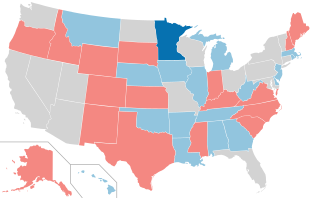
Howard Henry Baker Jr. was an American politician, diplomat and photographer who served as a United States Senator from Tennessee from 1967 to 1985. During his tenure, he rose to the rank of Senate Minority Leader and then Senate Majority Leader. A member of the Republican Party, Baker was the first Republican to be elected to the US Senate in Tennessee since the Reconstruction era.

Ross Bass was an American Congressman and United States Senator from Tennessee.

The 1990 United States Senate elections were held on Tuesday, November 6, 1990, with the 33 seats of Class 2 contested in regular elections. Special elections were also held to fill vacancies. The Democratic Party increased its majority with a net gain of one seat from the Republican Party. The election cycle took place in the middle of President George H. W. Bush's term, and, as with most other midterm elections, the party not holding the presidency gained seats in Congress. This was the last election cycle until 2022 where only one U.S. Senate seat flipped parties.

The 1984 United States Senate elections were held on November 6, with the 33 seats of Class 2 contested in regular elections. They coincided with the landslide re-election of President Ronald Reagan in the presidential election. In spite of the lopsided presidential race, Reagan's Republican Party suffered a net loss of two Senate seats to the Democrats, although it retained control of the Senate with a reduced 53–47 majority. Democrats defeated incumbents in Illinois and Iowa, and won an open seat in Tennessee, while Republicans defeated an incumbent in Kentucky.

The 1978 United States Senate elections were held on November 7, in the middle of Democratic President Jimmy Carter's term. The 33 seats of Class 2 were contested in regular elections. Special elections were also held to fill vacancies.

The 1972 United States Senate elections were held on November 7, with the 33 seats of Class 2 contested in regular elections. They coincided with the landslide re-election of Republican President Richard Nixon. Despite Nixon's landslide victory, Democrats increased their majority by two seats. The Democrats picked up open seats in Kentucky and South Dakota, and defeated four incumbent senators: Gordon Allott of Colorado, J. Caleb Boggs of Delaware, Jack Miller of Iowa, and Margaret Chase Smith of Maine. The Republicans picked up open seats in New Mexico, North Carolina, and Oklahoma, and defeated one incumbent, William B. Spong Jr. of Virginia.

The 1970 United States Senate elections was an election for the United States Senate. It took place on November 3, with the 33 seats of Class 1 contested in regular elections. Special elections were also held to fill vacancies. These races occurred in the middle of Richard Nixon's first term as president. The Democrats lost a net of three seats, while the Republicans and the Conservative Party of New York picked up one net seat each, and former Democrat Harry F. Byrd Jr. was re-elected as an independent.

The 1966 United States Senate elections were elections on November 8, 1966, for the United States Senate which occurred midway through the second term of President Lyndon B. Johnson. The 33 seats of Class 2 were contested in regular elections. Special elections were also held to fill vacancies. With divisions in the Democratic base over the Vietnam War, and with the traditional mid-term advantage of the party not holding the presidency, the Republicans took three Democratic seats, thereby breaking Democrats' 2/3rds supermajority. Despite Republican gains, the balance remained overwhelmingly in favor of the Democrats, who retained a 64–36 majority. Democrats were further reduced to 63–37, following the death of Robert F. Kennedy in June 1968.

The 1964 United States Senate elections were held on November 3. The 33 seats of Class 1 were contested in regular elections. Special elections were also held to fill vacancies. They coincided with the election of President Lyndon B. Johnson by an overwhelming majority, to a full term. His Democratic Party picked up a net two seats from the Republicans. As of 2023, this was the last time either party has had a two-thirds majority in the Senate, which allowed the Senate Democrats to override a veto, propose constitutional amendments, or convict and expel certain officials without any votes from Senate Republicans. However, internal divisions would have prevented the Democrats from having done so. The Senate election cycle coincided with Democratic gains in the House in the same year.

The 1952 United States Senate elections was an election for the United States Senate which coincided with the election of Dwight D. Eisenhower to the presidency by a large margin. The 32 Senate seats of Class 1 were contested in regular elections, and three special elections were held to fill vacancies. The Republicans took control of the Senate by managing to make a net gain of two seats. However, Wayne Morse (R-OR) became an independent forcing Republicans to rely on Vice President Richard Nixon's tie-breaking vote, although Republicans maintained a 48–47–1 plurality. Throughout the next Congress, Republicans were able to restore their 49–46–1 majority. This was the third time, as well as second consecutive, in which a sitting Senate leader lost his seat.

The 1930 United States Senate elections occurred in the middle of Republican President Herbert Hoover's term. The 32 seats of Class 2 were contested in regular elections, and special elections were held to fill vacancies. With the Great Depression beginning to take hold, Republican incumbents became unpopular, and Democrats picked up a net of eight seats, erasing the Republican gains from the previous election cycle, however, Republicans retained control of the chamber. This was the first of four consecutive Senate elections during the Depression in which Democrats made enormous gains, achieving a cumulative pick-up of 34 seats.

The 1994 United States Senate election in Tennessee was held November 8, 1994. Incumbent Democratic U.S. Senator Jim Sasser ran for re-election to a fourth term but was defeated by Republican nominee Bill Frist.

The 1984 United States Senate election in Tennessee took place on November 6, 1984, to select the U.S. Senator from the state of Tennessee. Popular three-term Republican incumbent Howard Baker, who had served as United States Senate Majority Leader since 1981 decided not to seek re-election in order to concentrate on a planned bid for the 1988 Republican presidential nomination. This left the seat open.

The 1964 United States Senate special election in Tennessee was held on November 3, 1964, concurrently with the U.S. presidential election as well the other regularly scheduled U.S. Senate election, as well as other elections to the United States Senate in other states as well as elections to the United States House of Representatives and various state and local elections. Following the death of Senator Estes Kefauver, Governor Frank G. Clement appointed Herbert S. Walters to fill the vacancy until the special election could take place. Walters decided not to run in the special election. Democratic nominee Ross Bass won the election, defeating Republican Howard Baker with 52.1% of the vote.

The 1966 United States Senate election in Alaska was held on November 8, 1966. Incumbent Democratic U.S. Senator Bob Bartlett was re-elected to a third term in office in a landslide, defeating Republican dentist Lee McKinley in a rematch of their 1960 race. Bartlett would not complete the term, dying in office on December 11, 1968, following complications after heart surgery. Ted Stevens would be elected to complete Bartlett's term, and would serve for 40 years in the U.S. Senate. This was the last time until 2008 that a Democrat was elected to Alaska's Class 2 Senate seat.

The 1978 United States Senate election in Tennessee took place on November 7, 1978, to select the U.S. Senator from the state of Tennessee. Two-term popular incumbent Republican U.S. Senator, Howard Baker, who had served as United States Senate Minority Leader since 1977, ran for re-election against first-time candidate and Democratic Party activist Jane Eskind. Baker won re-election in the general election.

The 1970 United States Senate election in Ohio took place on November 3, 1970. Incumbent Democratic Senator Stephen M. Young did not run for re-election to a third term in office. U.S. Representative Robert Taft Jr. won the open seat over Democrat Howard Metzenbaum.

The 1952 United States Senate election in Tennessee was held on November 4, 1952. Incumbent Democratic Senator and President pro tempore of the Senate Kenneth D. McKellar ran for re-election to a seventh term in office but was defeated in the Democratic primary by U.S. Representative Al Gore Sr. Gore easily won the general election against Republican Hobart Atkins.

The 1940 United States Senate election in Tennessee was held on November 5, 1940. Incumbent Democratic Senator Kenneth D. McKellar was re-elected to a fifth term in office, defeating Republican Howard Baker.

The 1964 United States Senate special election in Oklahoma took place on November 3, 1964. Democratic Senator Robert S. Kerr, who won re-election to his third term in 1960, died in office on January 1, 1963. Governor J. Howard Edmondson resigned from office so that his Lieutenant Governor, George Nigh, could appoint him to the U.S. Senate. Edmondson ran for election in the ensuing special election, and faced strong competition from former Governor Raymond D. Gary and State Senator Fred R. Harris. Edmondson placed first in the primary, but failed to win a majority, with Harris narrowly beating out Gary for second place. In the runoff, Harris defeated Edmondson in a landslide. In the general election, Harris faced former Oklahoma Sooners football coach Bud Wilkinson, the Republican nominee. Even though President Lyndon B. Johnson won Oklahoma by a wide margin over Republican presidential nominee Barry Goldwater, the Senate race was much closer. Ultimately, Harris only narrowly defeated Wilkinson by just 2% of the vote.





















